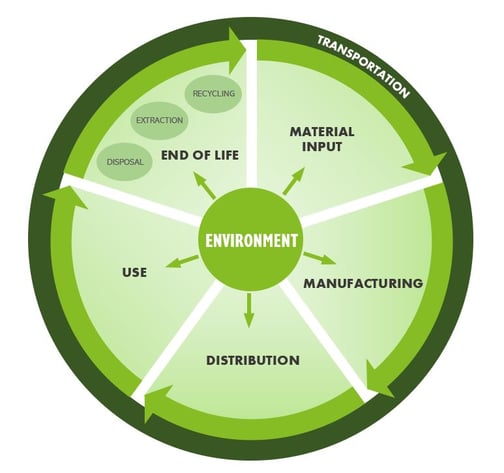
We believe that integrating sustainable values in the core businesses is vital to stay competitive and to play a role in shaping a sustainable future for the world we live in.
There is always place for improvement and it is important to constantly monitor performances in order to achieve great goals by addressing and enhancing change and innovation. For this reason we took part in the SKKIP research to assess our sustainability performances.
Read the whole article to better understand concepts like the Supply Chain Sustainability and the phenomenon of Greenwashing, and how Hemargroup is making progress in this direction.
Speaking of supply chain sustainability
Over the last few decades, there has been a growing interest among companies in a sustainable development, making sustainability part of the value propositon. Today, rethinking and re-planning business activities in a sustainable way is no longer a voluntary choice, rather it has become a 'forced' option to remain competitive in the market. Sustainability has become an essential driver for many business decisions, especially those concerning supply chain processes, which by nature have a greater impact on the environment. As a result, new concepts were born and are becoming more and more popular, such as Sustainable Supply Chain (SCS), Green Supply Chain (GSC), Closed Loop Supply Chain (CLSC), Circular Supply Chain (CSC) etc.
But what is exactly the Supply Chain Sustainability? Well, to put it bluntly, it is the management of environmental, social and economic impacts, and the encouragement of good governance practices throughout the lifecycles of goods and services. The goal of supply chain sustainability is to create, protect and grow long-term environmental, social and economic value for all stakeholders involved in bringing products and services to market. Indeed, environmental, social and economic impacts exist throughout each stage of the supply chain and in its governance, including the accountability and good conduct of external stakeholders:

The Greenwashing phenomenon
With the increasing pressure of integrating sustainability within the company, each organisation has followed different rhythms of development: some have decided to postpone the problem until the last moment, some have undertaken separate initiatives and some have decided right away to consider this aspect as a core value of their company.
Following this transformation toward sustainable processes leads to several advantages for the company. Studies have shown that consumers are increasingly sensitive to the issue of sustainability and are willing to spend more for products that are in line with this value. This makes it clear that, in addition to a competitive and reputational advantage, there is an economic benefit and added value. Integrating the principles of sustainability and of the Circular Economy in the supply chain allows companies, therefore, to enhance the offer with concepts that are now important and required by the market, to protect the long-term viability of their business as well as to secure a social license to operate.
The problem is that many organizations take advantage and attempt to capitalize on this growing demand for sustainability, by conveying a false impression or providing misleading information about how the company's products are more environmentally sustainable. This is called Greenwashing, basically occurring when companies make unsubstantiated claims to deceive consumers into believing that their products are environmentally friendly. For example, many claim to be more natural, healthier, free of chemicals, recyclable, or less wasteful of natural resources and more energy-saving. Although some of the environmental claims might be partly true, companies engaged in greenwashing typically exaggerate their claims or the benefits in an attempt to mislead consumers. In the majority of cases, when only a single ingredient or component of a product is ethically produced, companies doing greenwashing label the whole product as ethical and sustainable, even if that is not the whole truth.
For this reason is important to choose accurately partners and stakeholders, and even more is important to be attentive and not falling in the temptation of the greenwashing, rather to put real efforts in developing a sustainable supply chain to go along with the demand for sustainability and build a long-term profitable strategy.
SKKIP survey on sustainability performance
SKKIP is a management consulting start-up focused on finding the best solutions to complex problems through innovative methods, and oriented to assist clients with the decision-making processes – be it economic, productive, managerial, financial, supply chain, process, etc. – in order to better assess the impacts of these decisions on competitive advantage over time.
The research developed by SKKIP aims to draw a picture of the current situation by representing the evolution of the commitment of manufacturing companies in terms of sustainability in Italy and in Ticino. With a total of 34 manufacturing companies participating in the study, a survey was conducted to measure sustainability performances. To better analyze the concept, the survey has been articulated in three dimensions:

KNOWLEDGE OF THE TOPIC
The first dimension assesses the extent to which the company is aware of the main issues related to environmental sustainability, the tools and methods used to support decision-making, and the risks and potential related to the implementation of projects aimed at improving this performance.

ACTIONS TAKEN
The second one assesses the initiatives, both past and present, with which the company promotes sustainable development by combining economic growth with environmental and social growth, through the development of innovative business models. This dimension is therefore aimed at understanding how the company has decided to behave with regard to the issue of sustainability and how it has decided to take action.

PROCESSES
The last dimension assesses how many corporate processes have actually and concretely been involved in environmental sustainability actions, defining whether the company focuses its efforts only on certain processes or whether it adopts a transversal and systemic approach.
From the results of the survey, one aspect clearly emerges: companies with a good knowledge and culture of sustainability do not remain indifferent to the issue but take action to implement positive changes. Furthermore, as the degree of knowledge increases, so does the organisation's ability to apply different strategies to different processes to achieve more relevant benefits in terms of environmental impacts.
The second important thing, resulted from the survey, is that around half of the companies, which took part in the study, stated that they were not aware of the phenomenon of Greenwashing or did not know how to distinguish between Greenwashing and sustainable activities. This is not a bad thing in itself, as it can be quickly remedied with the right training programmes and tools, but it can become dangerous if the company is not aware of its deficiencies or if it is not sufficiently prepared in this field. In fact, a lack of knowledge on the subject can lead even the most virtuous companies to undertake, in good faith, actions aimed at improving sustainability that are little or not at all effective (and sometimes even negative for the environment).
Hemargroup is making progress on sustainability
We are happy to share with you the results of Hemargroup sustainability. As a manufacturing company, we took part in the SKKIP research in order to conduct a specific assessment of our current sustainability performances. According to the survey results, our company is in line with the average performance of the sample analysed and we have got a good balance between the actions taken and the knowledge acquired about environmental sustainability. Our position concerning the adoption of new sustainable solutions is cautious and this allows us to recognize and adopt only effective sustainable strategies already well-established in the industry, without being innovators but avoiding inefficient experimentations. Also, it emerged that the most sustainable stage of our supply chain is the production process, which is indeed our biggest and most developed department.
In addition, companies operating in the electronic manufacturing services sector, to which Hemargroup belongs, are trying to solve various environmental challenges by implementing innovative strategies and actions. Among them, most common objectives are reducing the use of raw materials by repairing and regenerating finished products and components; monitoring the disposal of waste; replacing fossil fuels with renewable ones; reducing energy consumption through an efficient manufacturing strategy; reducing water consumption during the production cycle, etc. The advice given to us, in order to stay in line with industry trends, is to continue to implement actions and strategies that impact not only the core processes but also more indirect processes.
Hemargroup is making progress on integrating sustainability in the supply chain. Indeed, we are proud to have recently obtained a new certification ISO 14001, which attests our environmental responsibilities. We take care about sustainability and we think that integrating such values in the core businesses is fundamental to stay competitive and to play a role in shaping a sustainable future, for the planet, for the economy and for all of us. We believe that we can always improve and it is important to constantly monitor our performances in order to achieve great goals by addressing and enhancing change and innovation.
Are you in line with our values and are you looking for an electronic manufacturing partner for your project development or production?
Don't hesitate to contact us for more information or for requesting a quotation on our services.
.png)
